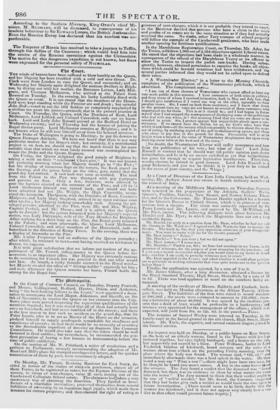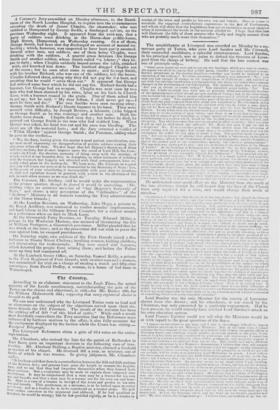An inquest was held on Monday, at a public-house on
Kew Green, on the body of an elderly woman, found in the Thames with her legs fastened together, her eyes tightly bandaged, and a bruise on the eye, but apparently not caused by a blow. Peter Williams, butler to Lord Frederick Gordon of Isleworth, beard screams and the voice of a woman about four o'clock on the preceding Friday morning, near the place where the body was found. The woman said, " Oh, oh!" and immediately afterwards there was a loud splash in the water. He then heard a man say " What u row !"—there might have been two men, for be thought he beard two men's voices. A boy the same house heard the screams. The Jury found a verdict that the deceased was "found drowned, but there was no evidence to show by what means she came into the water," The Jury seemed to think that their verdict ought to be one of " wilful murder," but Mr. Scard, the Coroner, suggested that they had better give such a verdict as would leave the case open to future investigation. [There would seem to be little doubt that the woman was murdered ; and it does not appear very clearly how a ver- dict to that effect would prevent future inquiry.]
A Coroner's Jury assembled on Monday afternoon, in the Board- room of the North London Hospital, to inquire into the circumstances attending the death of James Chaplin, the shoemaker, who was stabbed at Hampstead by George Smith, a discharged sokier, on the previous Wednesday night. It appeared from the evidt nee, that a party of soldiers were drinking at the Horse-shoe public-house, High Street, Hampstead, on Wednesday evening. 01 e of them, George Smith, had been that day discharged on account of mental im- becility; which, however, was suspected to have been partly assumed. Several other men, not soldiers, one of them being Chaplin, were drinking with the soldiers. A quarrel arose between this George Smith and another soldier, whom •Smith called "a lobster ;" they be- gan to fight ; when Chaplin suddenly leaped across the table, attacked mith, and knocked him down. The landlord dragged Chaplin out of the room ; but he soon after came in again ; and George Smith, with his brother Richard, who was one of the soldiers, left the house.
Chaplin followed them, asking why they did not pay for tl e beer, and swearing that he would " serve them out." It appeared lint George bad ordered some beer which he did not pay for. Richard Smith had a bayonet, but George had no weapon. Chaplin was next seen by two men who had been alarmed by his cries, lying on his back in Church Lane, with a bayonet wound in the groin. One of them asked him
to get up ; but he said, " My dear fellow, I shall never get up—I must lie here and die." The two Smiths were seen running away;
George Smith with Richard's bloody bayonet in his hand. They were secured with difficulty, by Joseph Bowers, a labourer, (who tripped up George Smith as be was running) and another man. Both the Smiths were drunk. Chaplin died next day ; but before he died, he pointed out George Smith as the man who had stabbed him. When George was taken, his hand was cut and his nose was bleeding. The above are all the material facts ; and the Jury returned a verdict of " Wilful Murder " against George Smith ; the Foreman, adding when he gave in the verdict- ., We, the Jury, having given the matter a most patient consideration, can- not now avoid expressing our disapprobation of private soldiers wearing their side-arms when otf duty. We alto hope that her Majesty's Secretary of State will lose no time, but at once impress upon the mind of Lord Hill, the Com- mander-in-Chief, the absolute necessity of doing away with the practice, of which see feel it our bounden duty to complain, as other instances of stabbing with the bayonet, but happily not attended with fatal consequences, have re- cently taken place in the metropolis. We have now, Mr. Coroner, to request that you will cause our protest to be transmitted to the Secretary of State: but, in the event of your considering it incompatible with your duty to interfere, we shall t;:el ourselves bound to proceed, with a view to the abolitiou of the evil, in such other manner as we may think fit."
The Coroner, Mr. Stirling, said be would make the representation in the proper quarter, though he feared it would be unavailing. "Mr.
Stirling takes an accurate measure of "her Majesty's Secretary of State," and shows a nice perception of the " difficulties " of the " Reform " Ministry in all matters touching the Tory administration of the Horse Guards.] At the London Sessions, on Wednesday, John Hogg, a private in the Royal Artillery, was sentenced to twelve mouths' imprisonment, and hard labour in the Giltspur Street Compter, for a violent assault on a policeman when on duty in Mark Lane. At the Greenwich Petty Sessions, on Tuesday, Edward Miller, a private in the Woolwich Marines, was accused of' threatening the life of William Pettigrew, a Greenwich pensioner. Miller pleaded that he was drunk at the time; and as the prosecutor did not wish to press the case against him, he escaped punishment.
On Saturday night, two soldiers of the Foot Guards raised a dis- turbance in Sloane Street Chelsea; insulting women, kicking children,
and threatening the tradespeople. They were armed with bayonets, which deterred the people from seizing them ; and before the Police came up they had scampered off.
At the Lambeth Street Office, on Saturday, Samuel Kelly, a private in the First Regiment of Foot Guards, with another man and a woman, was committed for trial on a charge of stealing a watch and fifty-nine sovereigns, from David Duffey, a seaman, in a house of bad fame in Whitechapel.



























 Previous page
Previous page